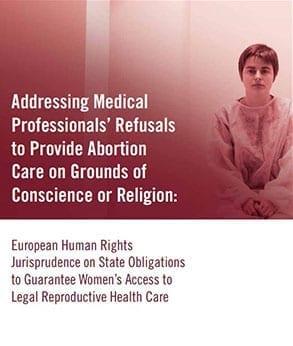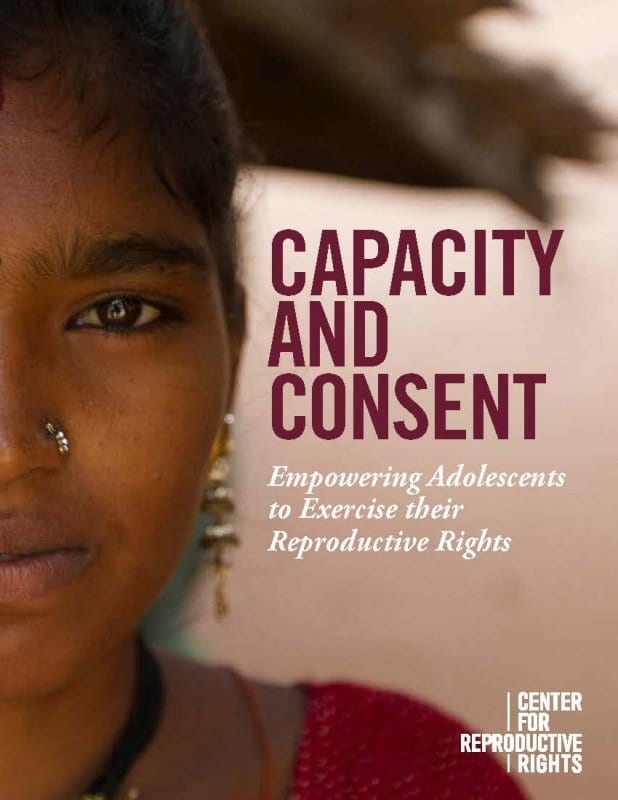PUBLIC SERVICE EUROPE: Spain and Romania Backslide on Abortion
by Nancy Northup, President & CEO at the Center for Reproductive Rights
In recent decades—as an overwhelming preponderance of evidence has established an inextricable link between the availability of safe, legal means of ending a pregnancy and the fulfillment of women’s right to health—many governments worldwide have wisely moved to lift or relax legal restrictions on abortion. Recently, the World Health Organisation has added its imprimatur to these progressive policies, publishing new guidance to world governments on safe abortion—clearly stating that guaranteeing safe abortion services is both good public health policy and essential to protecting women’s fundamental human rights.
So why are some European countries suddenly moving in the opposite direction? Just two years ago, Spain reformed its reproductive health laws to make abortion available without restriction as to reason during the first trimester of pregnancy—even framing abortion as a right that deserves public funding. But now the country’s new government is working to dial back this progressive policy, proposing new measures that would force women to justify their decisions to end their pregnancies before they can have an abortion and reintroduce strict parental consent requirements for adolescents.
In Romania, the parliament is considering a new proposal that would require women seeking an abortion to endure biased counseling at religiously affiliated ‘crisis pregnancy centers’—during which they would be forced to view photos or videos of abortion procedures and view ultrasound images of their fetuses. Then, they have to wait through a so-called ‘reflection period’ of five days before they can undergo the procedure.
The imposition of such onerous restrictions flies in the face of reason and all available evidence. And it conflicts with the publication of the WHO’s guidance—the considered opinion of the world’s leading body of health and medical experts. The WHO clearly states that restrictions on abortion like those under consideration in Spain and Romania demean women as decision makers. The restraints also deter and delay them from seeking the reproductive healthcare they need and place their health and autonomy at risk.
The consequences could not be graver. According to the WHO, approximately 22 million unsafe abortions occur each year worldwide, resulting in the death of 47,000 women and an additional five million injuries. Restricting legal access to abortion only exacerbates the problem. And the WHO is not the first international body to recognise this, especially in Europe.
The European Court of Human Rights has found that governments have a responsibility to ensure access to abortion where it is legal and that denying women legal reproductive health services can amount to inhuman and degrading treatment—a clear violation of the European Convention on Human Rights. The United Nations committee on the elimination of discrimination against women has resoundingly confirmed that denying health services that only women need, including abortion services, amounts to sex discrimination and violates international human rights law.
The good news is that, despite the troubling proposals in Spain and Romania, the progressive policies of many European countries stand as evidence supporting the conclusions of the WHO, human rights bodies and advocates worldwide. They also act as models for those nations that have yet to reform their reproductive health laws and policies to protect women’s lives, rights, and health.
Five years ago, Portugal revised its abortion law to legalise abortion upon request until the 10th week of pregnancy and thereafter in cases of fetal impairment, when the pregnancy is the result of a crime or when it threatens the woman’s life or health. Portugal has also since made medical abortion far more accessible to women across the country than it was in the past.
Switzerland’s Federal Assembly passed a law in 2002, allowing abortion on request during the first trimester after a large majority of the population supported liberalisation of the restrictive abortion law in a referendum. The French government made abortion more accessible to women in 2001, by extending the period during which abortion is available without restriction as to reason. And Denmark and Sweden both amended their laws in the last decade to remove restrictions on the ability for non-residents to obtain abortion services in their countries.
These advances yield widespread positive outcomes for women’s health and wellbeing. According to research by the Guttmacher Institute, in countries where abortion laws have been liberalized women experience fewer abortion-related complications and maternal deaths plummet. When South Africa liberalised its abortion law in 1996, studies found that the number of women suffering from infection—due to unsafe abortion—had been cut in half by 2000. And maternal deaths were reduced by 91 per cent in the same short timeframe.
Governments have a fundamental responsibility to respect, protect and fulfill the basic human rights of their people and ensure women are treated as equal members of society. And those progressive European governments that are fulfilling this responsibility should use the publication of the WHO’s new guidelines to advocate forcefully for their neighbours to resist pressure to turn back the clock. They must take the necessary steps to protect the fundamental reproductive rights of all European women.
Read the original OpEd posted at Public Service Europe >,


